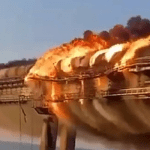Tata Steel stated on Friday that it will close its two blast furnaces in Britain by the end of this year, potentially resulting to the loss of up to 2,800 jobs at its steelworks unit in Wales.
The closures are part of India-owned Tata Steel’s effort to turn around its loss-making UK steelmaking business by transitioning to lower carbon electric arc furnaces, which is supported by 500 million pounds in government funding.
Tata Steel said it would start a consultation process as part of its restructuring plan.
It said that about 2,500 roles were likely to be impacted in the next 18 months, with 2,800 jobs affected overall and it would try to maximise voluntary redundancies.

This initiative aims to reverse more than a decade of losses and shift from legacy blast furnaces to a more sustainable, green steel industry, according to a Tata Steel press statement.
The transformation intends to preserve the majority of Tata Steel UK’s current product capabilities while ensuring the country’s steelmaking self-sufficiency.
Furthermore, it is expected to cut Tata Steel UK’s CO2 emissions by 5 million tonnes per year, contributing to an overall reduction of about 1.5% in UK national emissions.
Tata Steel employs more than 8,000 people in the UK, but the warning that as many as 3,000 of those jobs could go came in September when the government announced a funding package to help safeguard 5,000 jobs.
The electric arc furnaces are operated by fewer workers compared to the blast furnaces.
Tata Steel has initiated engineering design work and construction planning for the proposed Electric Arc Furnace, aiming for completion in 2027.
The furnace is envisioned to be among the most advanced globally. Ongoing discussions with National Grid are underway for enabling infrastructure, and engagements with local authorities and regulators have commenced.
Tata Steel is investing £1.25 billion in Electric Arc Furnace technology in Port Talbot as part of its transformation plan, as well as upgrading equipment to ensure long-term, high-quality output at the UK’s largest steelmaker.
The government has allocated up to £500 million to fund the change, with Tata Steel providing £750 million.
Additional funds will be committed for a comprehensive support package that will include affected personnel, company restructuring, and transition costs, underlining Tata Steel’s long-term commitment to UK production.
Tata Steel stated on Friday that it will close its two blast furnaces in Britain by the end of this year, potentially resulting to the loss of up to 2,800 jobs at its steelworks unit in Wales.
The closures are part of India-owned Tata Steel’s effort to turn around its loss-making UK steelmaking business by transitioning to lower carbon electric arc furnaces, which is supported by 500 million pounds in government funding.
Tata Steel said it would start a consultation process as part of its restructuring plan.
It said that about 2,500 roles were likely to be impacted in the next 18 months, with 2,800 jobs affected overall and it would try to maximise voluntary redundancies.

This initiative aims to reverse more than a decade of losses and shift from legacy blast furnaces to a more sustainable, green steel industry, according to a Tata Steel press statement.
The transformation intends to preserve the majority of Tata Steel UK’s current product capabilities while ensuring the country’s steelmaking self-sufficiency.
Furthermore, it is expected to cut Tata Steel UK’s CO2 emissions by 5 million tonnes per year, contributing to an overall reduction of about 1.5% in UK national emissions.
Tata Steel employs more than 8,000 people in the UK, but the warning that as many as 3,000 of those jobs could go came in September when the government announced a funding package to help safeguard 5,000 jobs.
The electric arc furnaces are operated by fewer workers compared to the blast furnaces.
Tata Steel has initiated engineering design work and construction planning for the proposed Electric Arc Furnace, aiming for completion in 2027.
The furnace is envisioned to be among the most advanced globally. Ongoing discussions with National Grid are underway for enabling infrastructure, and engagements with local authorities and regulators have commenced.
Tata Steel is investing £1.25 billion in Electric Arc Furnace technology in Port Talbot as part of its transformation plan, as well as upgrading equipment to ensure long-term, high-quality output at the UK’s largest steelmaker.
The government has allocated up to £500 million to fund the change, with Tata Steel providing £750 million.
Additional funds will be committed for a comprehensive support package that will include affected personnel, company restructuring, and transition costs, underlining Tata Steel’s long-term commitment to UK production.
Tata Steel stated on Friday that it will close its two blast furnaces in Britain by the end of this year, potentially resulting to the loss of up to 2,800 jobs at its steelworks unit in Wales.
The closures are part of India-owned Tata Steel’s effort to turn around its loss-making UK steelmaking business by transitioning to lower carbon electric arc furnaces, which is supported by 500 million pounds in government funding.
Tata Steel said it would start a consultation process as part of its restructuring plan.
It said that about 2,500 roles were likely to be impacted in the next 18 months, with 2,800 jobs affected overall and it would try to maximise voluntary redundancies.

This initiative aims to reverse more than a decade of losses and shift from legacy blast furnaces to a more sustainable, green steel industry, according to a Tata Steel press statement.
The transformation intends to preserve the majority of Tata Steel UK’s current product capabilities while ensuring the country’s steelmaking self-sufficiency.
Furthermore, it is expected to cut Tata Steel UK’s CO2 emissions by 5 million tonnes per year, contributing to an overall reduction of about 1.5% in UK national emissions.
Tata Steel employs more than 8,000 people in the UK, but the warning that as many as 3,000 of those jobs could go came in September when the government announced a funding package to help safeguard 5,000 jobs.
The electric arc furnaces are operated by fewer workers compared to the blast furnaces.
Tata Steel has initiated engineering design work and construction planning for the proposed Electric Arc Furnace, aiming for completion in 2027.
The furnace is envisioned to be among the most advanced globally. Ongoing discussions with National Grid are underway for enabling infrastructure, and engagements with local authorities and regulators have commenced.
Tata Steel is investing £1.25 billion in Electric Arc Furnace technology in Port Talbot as part of its transformation plan, as well as upgrading equipment to ensure long-term, high-quality output at the UK’s largest steelmaker.
The government has allocated up to £500 million to fund the change, with Tata Steel providing £750 million.
Additional funds will be committed for a comprehensive support package that will include affected personnel, company restructuring, and transition costs, underlining Tata Steel’s long-term commitment to UK production.
Tata Steel stated on Friday that it will close its two blast furnaces in Britain by the end of this year, potentially resulting to the loss of up to 2,800 jobs at its steelworks unit in Wales.
The closures are part of India-owned Tata Steel’s effort to turn around its loss-making UK steelmaking business by transitioning to lower carbon electric arc furnaces, which is supported by 500 million pounds in government funding.
Tata Steel said it would start a consultation process as part of its restructuring plan.
It said that about 2,500 roles were likely to be impacted in the next 18 months, with 2,800 jobs affected overall and it would try to maximise voluntary redundancies.

This initiative aims to reverse more than a decade of losses and shift from legacy blast furnaces to a more sustainable, green steel industry, according to a Tata Steel press statement.
The transformation intends to preserve the majority of Tata Steel UK’s current product capabilities while ensuring the country’s steelmaking self-sufficiency.
Furthermore, it is expected to cut Tata Steel UK’s CO2 emissions by 5 million tonnes per year, contributing to an overall reduction of about 1.5% in UK national emissions.
Tata Steel employs more than 8,000 people in the UK, but the warning that as many as 3,000 of those jobs could go came in September when the government announced a funding package to help safeguard 5,000 jobs.
The electric arc furnaces are operated by fewer workers compared to the blast furnaces.
Tata Steel has initiated engineering design work and construction planning for the proposed Electric Arc Furnace, aiming for completion in 2027.
The furnace is envisioned to be among the most advanced globally. Ongoing discussions with National Grid are underway for enabling infrastructure, and engagements with local authorities and regulators have commenced.
Tata Steel is investing £1.25 billion in Electric Arc Furnace technology in Port Talbot as part of its transformation plan, as well as upgrading equipment to ensure long-term, high-quality output at the UK’s largest steelmaker.
The government has allocated up to £500 million to fund the change, with Tata Steel providing £750 million.
Additional funds will be committed for a comprehensive support package that will include affected personnel, company restructuring, and transition costs, underlining Tata Steel’s long-term commitment to UK production.
Tata Steel stated on Friday that it will close its two blast furnaces in Britain by the end of this year, potentially resulting to the loss of up to 2,800 jobs at its steelworks unit in Wales.
The closures are part of India-owned Tata Steel’s effort to turn around its loss-making UK steelmaking business by transitioning to lower carbon electric arc furnaces, which is supported by 500 million pounds in government funding.
Tata Steel said it would start a consultation process as part of its restructuring plan.
It said that about 2,500 roles were likely to be impacted in the next 18 months, with 2,800 jobs affected overall and it would try to maximise voluntary redundancies.

This initiative aims to reverse more than a decade of losses and shift from legacy blast furnaces to a more sustainable, green steel industry, according to a Tata Steel press statement.
The transformation intends to preserve the majority of Tata Steel UK’s current product capabilities while ensuring the country’s steelmaking self-sufficiency.
Furthermore, it is expected to cut Tata Steel UK’s CO2 emissions by 5 million tonnes per year, contributing to an overall reduction of about 1.5% in UK national emissions.
Tata Steel employs more than 8,000 people in the UK, but the warning that as many as 3,000 of those jobs could go came in September when the government announced a funding package to help safeguard 5,000 jobs.
The electric arc furnaces are operated by fewer workers compared to the blast furnaces.
Tata Steel has initiated engineering design work and construction planning for the proposed Electric Arc Furnace, aiming for completion in 2027.
The furnace is envisioned to be among the most advanced globally. Ongoing discussions with National Grid are underway for enabling infrastructure, and engagements with local authorities and regulators have commenced.
Tata Steel is investing £1.25 billion in Electric Arc Furnace technology in Port Talbot as part of its transformation plan, as well as upgrading equipment to ensure long-term, high-quality output at the UK’s largest steelmaker.
The government has allocated up to £500 million to fund the change, with Tata Steel providing £750 million.
Additional funds will be committed for a comprehensive support package that will include affected personnel, company restructuring, and transition costs, underlining Tata Steel’s long-term commitment to UK production.
Tata Steel stated on Friday that it will close its two blast furnaces in Britain by the end of this year, potentially resulting to the loss of up to 2,800 jobs at its steelworks unit in Wales.
The closures are part of India-owned Tata Steel’s effort to turn around its loss-making UK steelmaking business by transitioning to lower carbon electric arc furnaces, which is supported by 500 million pounds in government funding.
Tata Steel said it would start a consultation process as part of its restructuring plan.
It said that about 2,500 roles were likely to be impacted in the next 18 months, with 2,800 jobs affected overall and it would try to maximise voluntary redundancies.

This initiative aims to reverse more than a decade of losses and shift from legacy blast furnaces to a more sustainable, green steel industry, according to a Tata Steel press statement.
The transformation intends to preserve the majority of Tata Steel UK’s current product capabilities while ensuring the country’s steelmaking self-sufficiency.
Furthermore, it is expected to cut Tata Steel UK’s CO2 emissions by 5 million tonnes per year, contributing to an overall reduction of about 1.5% in UK national emissions.
Tata Steel employs more than 8,000 people in the UK, but the warning that as many as 3,000 of those jobs could go came in September when the government announced a funding package to help safeguard 5,000 jobs.
The electric arc furnaces are operated by fewer workers compared to the blast furnaces.
Tata Steel has initiated engineering design work and construction planning for the proposed Electric Arc Furnace, aiming for completion in 2027.
The furnace is envisioned to be among the most advanced globally. Ongoing discussions with National Grid are underway for enabling infrastructure, and engagements with local authorities and regulators have commenced.
Tata Steel is investing £1.25 billion in Electric Arc Furnace technology in Port Talbot as part of its transformation plan, as well as upgrading equipment to ensure long-term, high-quality output at the UK’s largest steelmaker.
The government has allocated up to £500 million to fund the change, with Tata Steel providing £750 million.
Additional funds will be committed for a comprehensive support package that will include affected personnel, company restructuring, and transition costs, underlining Tata Steel’s long-term commitment to UK production.
Tata Steel stated on Friday that it will close its two blast furnaces in Britain by the end of this year, potentially resulting to the loss of up to 2,800 jobs at its steelworks unit in Wales.
The closures are part of India-owned Tata Steel’s effort to turn around its loss-making UK steelmaking business by transitioning to lower carbon electric arc furnaces, which is supported by 500 million pounds in government funding.
Tata Steel said it would start a consultation process as part of its restructuring plan.
It said that about 2,500 roles were likely to be impacted in the next 18 months, with 2,800 jobs affected overall and it would try to maximise voluntary redundancies.

This initiative aims to reverse more than a decade of losses and shift from legacy blast furnaces to a more sustainable, green steel industry, according to a Tata Steel press statement.
The transformation intends to preserve the majority of Tata Steel UK’s current product capabilities while ensuring the country’s steelmaking self-sufficiency.
Furthermore, it is expected to cut Tata Steel UK’s CO2 emissions by 5 million tonnes per year, contributing to an overall reduction of about 1.5% in UK national emissions.
Tata Steel employs more than 8,000 people in the UK, but the warning that as many as 3,000 of those jobs could go came in September when the government announced a funding package to help safeguard 5,000 jobs.
The electric arc furnaces are operated by fewer workers compared to the blast furnaces.
Tata Steel has initiated engineering design work and construction planning for the proposed Electric Arc Furnace, aiming for completion in 2027.
The furnace is envisioned to be among the most advanced globally. Ongoing discussions with National Grid are underway for enabling infrastructure, and engagements with local authorities and regulators have commenced.
Tata Steel is investing £1.25 billion in Electric Arc Furnace technology in Port Talbot as part of its transformation plan, as well as upgrading equipment to ensure long-term, high-quality output at the UK’s largest steelmaker.
The government has allocated up to £500 million to fund the change, with Tata Steel providing £750 million.
Additional funds will be committed for a comprehensive support package that will include affected personnel, company restructuring, and transition costs, underlining Tata Steel’s long-term commitment to UK production.
Tata Steel stated on Friday that it will close its two blast furnaces in Britain by the end of this year, potentially resulting to the loss of up to 2,800 jobs at its steelworks unit in Wales.
The closures are part of India-owned Tata Steel’s effort to turn around its loss-making UK steelmaking business by transitioning to lower carbon electric arc furnaces, which is supported by 500 million pounds in government funding.
Tata Steel said it would start a consultation process as part of its restructuring plan.
It said that about 2,500 roles were likely to be impacted in the next 18 months, with 2,800 jobs affected overall and it would try to maximise voluntary redundancies.

This initiative aims to reverse more than a decade of losses and shift from legacy blast furnaces to a more sustainable, green steel industry, according to a Tata Steel press statement.
The transformation intends to preserve the majority of Tata Steel UK’s current product capabilities while ensuring the country’s steelmaking self-sufficiency.
Furthermore, it is expected to cut Tata Steel UK’s CO2 emissions by 5 million tonnes per year, contributing to an overall reduction of about 1.5% in UK national emissions.
Tata Steel employs more than 8,000 people in the UK, but the warning that as many as 3,000 of those jobs could go came in September when the government announced a funding package to help safeguard 5,000 jobs.
The electric arc furnaces are operated by fewer workers compared to the blast furnaces.
Tata Steel has initiated engineering design work and construction planning for the proposed Electric Arc Furnace, aiming for completion in 2027.
The furnace is envisioned to be among the most advanced globally. Ongoing discussions with National Grid are underway for enabling infrastructure, and engagements with local authorities and regulators have commenced.
Tata Steel is investing £1.25 billion in Electric Arc Furnace technology in Port Talbot as part of its transformation plan, as well as upgrading equipment to ensure long-term, high-quality output at the UK’s largest steelmaker.
The government has allocated up to £500 million to fund the change, with Tata Steel providing £750 million.
Additional funds will be committed for a comprehensive support package that will include affected personnel, company restructuring, and transition costs, underlining Tata Steel’s long-term commitment to UK production.














